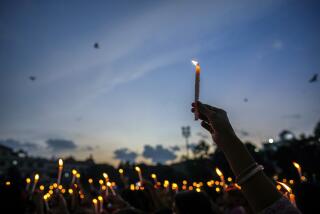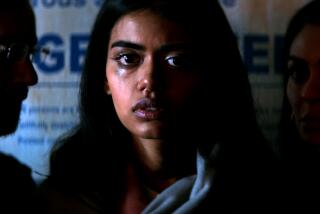Review: ‘India’s Daughter’ traces atrocity that became a tipping point
Don’t mistake the brief running time of “India’s Daughter” for a lack of importance or ability to involve. Though it lasts only 63 minutes, this documentary’s impact is devastating.
While the subject here, the appalling 2012 gang rape and murder of a young medical student in India, may be familiar, hearing them recounted is so disturbing that the film was banned in India just days before its scheduled television broadcast.
SIGN UP for the free Indie Focus movies newsletter >>
More than that, producer-director Leslee Udwin has shed a disturbing light on the chauvinistic, patriarchal mind-set that is the soil in which horrific acts are allowed to grow. The interviews she obtained with one of the convicted men and one of the defense attorneys are, for Western audiences at least, jaw-dropping.
One interesting choice the filmmaker has made is not to show any contemporary photographs of the murdered woman, 23-year-old medical student Jyoti Singh. She was often referred to in the media as “India’s Daughter” (hence the film’s title), and that sense of her as in part symbolic of a larger situation may have led to that choice.
Clearly an indefatigable reporter, Udwin has gotten interviews with numerous people involved with the situation, most movingly with Singh’s parents. They are beyond distraught about what happened to the promising daughter who wanted to be a doctor from childhood and whose education they financed by selling family land, unusual in a male-dominated society.
“India’s Daughter” also spends time painstakingly reconstructing the crime, which began at 8:30 p.m. in Delhi after Singh and a male friend boarded a private bus, a common form of transportation in India, to go home after having gone to a movie theater to see “Life of Pi.” The friend was beaten and Singh raped and tortured before both were literally thrown off the bus. As Singh’s father says, “They went beyond all limits of evil. Even a devil wouldn’t commit such a crime.”
The news of this atrocity proved to be a genuine tipping point in India, a country where a rape occurs every 20 minutes but the culture of shame that has grown up around the act means things are rarely reported. It led to a month of massive daily demonstrations, including pitched battles with police, by people demanding a change in the prevailing culture.
Aside from Singh’s parents, the film talks with one of her friends, with policemen and investigators as well as the uncomprehending young wife of one of the convicted perpetrators, unsure how she will live without a husband to provide for her.
However the two interviews everyone will be talking about are with Mukesh Singh, one of the convicted rapists (who claims he did no more than drive the bus), and M.L. Sharma, an attorney for the defense team.
Both men seem to believe that women who walk on the streets without being accompanied by either a husband or a male family member are the responsible parties in a rape. “You can’t clap with one hand, a decent girl won’t roam around at 9 o’clock,” says Singh, while attorney Sharma says that “the moment the victim left her home unchaperoned, she left her morality and her reputation as a doctor behind.” If one of his own daughters did that, he adds, “I would burn her alive.”
Not surprisingly, the ramifications of this case in India have been considerable, including the issuing by the government of the groundbreaking Verma Report, which offered proposals for dealing with gender violence. And, “India’s Daughter” informs, reports of rape are up 55% since this incident. “The silence,” as one commentator puts it, “has been broken.”
------------
‘India’s Daughter’
MPAA rating: None
Running time: 1 hour, 22 minutes
Playing: Sundance Sunset Theater, West Hollywood
More to Read
Only good movies
Get the Indie Focus newsletter, Mark Olsen's weekly guide to the world of cinema.
You may occasionally receive promotional content from the Los Angeles Times.











